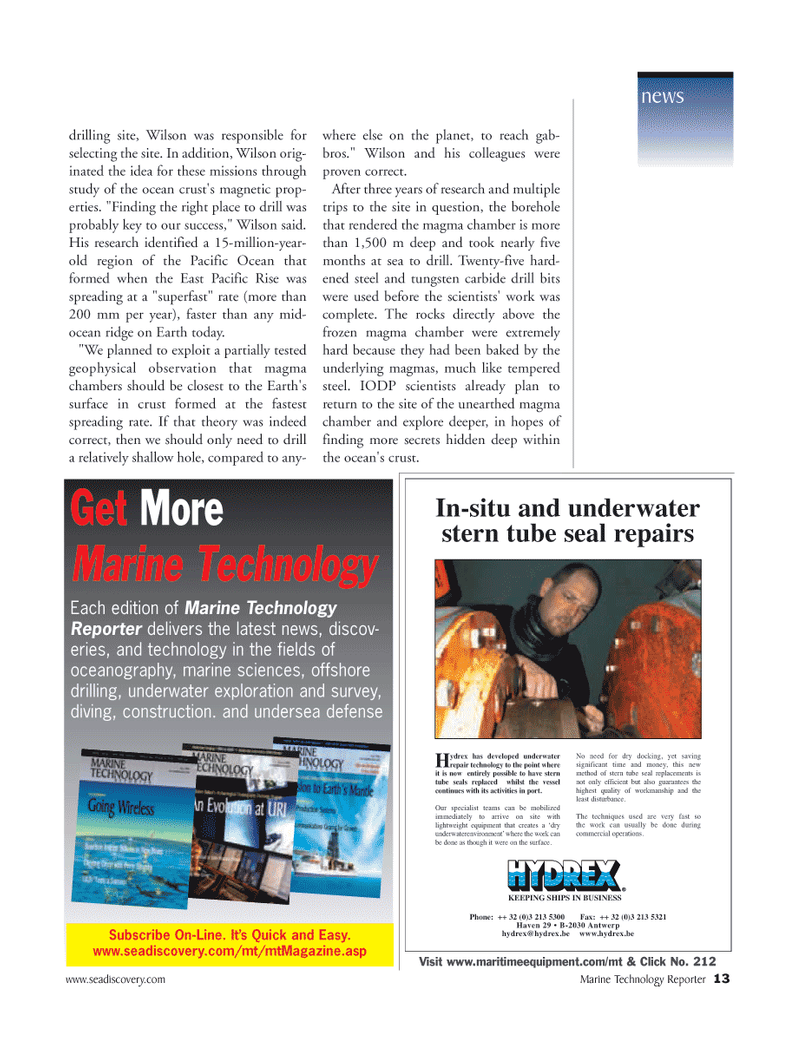
Page 13: of Marine Technology Magazine (May 2006)
The Communications Edition
Read this page in Pdf, Flash or Html5 edition of May 2006 Marine Technology Magazine
Get More
Marine Technology
Each edition of Marine Technology
Reporter delivers the latest news, discov- eries, and technology in the fields of oceanography, marine sciences, offshore drilling, underwater exploration and survey, diving, construction. and undersea defense
Subscribe On-Line. It’s Quick and Easy. www.seadiscovery.com/mt/mtMagazine.asp drilling site, Wilson was responsible for selecting the site. In addition, Wilson orig- inated the idea for these missions through study of the ocean crust's magnetic prop- erties. "Finding the right place to drill was probably key to our success," Wilson said.
His research identified a 15-million-year- old region of the Pacific Ocean that formed when the East Pacific Rise was spreading at a "superfast" rate (more than 200 mm per year), faster than any mid- ocean ridge on Earth today. "We planned to exploit a partially tested geophysical observation that magma chambers should be closest to the Earth's surface in crust formed at the fastest spreading rate. If that theory was indeed correct, then we should only need to drill a relatively shallow hole, compared to any- where else on the planet, to reach gab- bros." Wilson and his colleagues were proven correct.
After three years of research and multiple trips to the site in question, the borehole that rendered the magma chamber is more than 1,500 m deep and took nearly five months at sea to drill. Twenty-five hard- ened steel and tungsten carbide drill bits were used before the scientists' work was complete. The rocks directly above the frozen magma chamber were extremely hard because they had been baked by the underlying magmas, much like tempered steel. IODP scientists already plan to return to the site of the unearthed magma chamber and explore deeper, in hopes of finding more secrets hidden deep within the ocean's crust. news www.seadiscovery.com Marine Technology Reporter 13
H ydrex has developed underwater repair technology to the point where it is now entirely possible to have stern tube seals replaced whilst the vessel continues with its activities in port.
Our specialist teams can be mobilized immediately to arrive on site with lightweight equipment that creates a ‘dry underwaterenvironment’ where the work can be done as though it were on the surface.
No need for dry docking, yet saving significant time and money, this new method of stern tube seal replacements is not only efficient but also guarantees the highest quality of workmanship and the least disturbance.
The techniques used are very fast so the work can usually be done during commercial operations.
Phone: ++ 32 (0)3 213 5300 Fax: ++ 32 (0)3 213 5321
Haven 29 • B-2030 Antwerp [email protected] www.hydrex.be
In-situ and underwater stern tube seal repairs
KEEPING SHIPS IN BUSINESS
Visit www.maritimeequipment.com/mt & Click No. 212
MTR#4 (1-16).qxd 5/9/2006 12:06 PM Page 15

 12
12

 14
14
